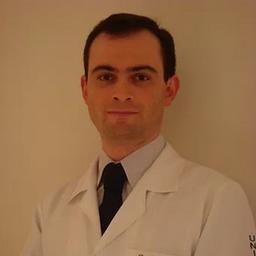Additional Filters
Best Geriatrician
Found 2 Geriatrician
Dr. João Carlos Pereira Gomes
Geriatrician and general practitioner in São Paulo
Geriatrician
Dr. Renato Laks
Specialist in Internal Medicine and Geriatrics in São Paulo
General practitioner (GP)
Visitors who were interested in Geriatrician also searched for:
- Cognitive Assessment Power Attorney
- Treatment Depression Elderly Patient
- Geriatric Home Visit
- Balance Pharmacological Treatment
- Treatment Of A Terminally Ill Patient And The Family Accompaniment
- Treatment Recurrent Falls
- Writing A Medical Opinion If A Person Is Eligible To Sign A Will
- Online Geriatric Consultation
- Chronic Pain Management
- Writing A Medical Opinion For Foreign Worker'S License
Geriatrician by cities
Visitors who were interested in Geriatrician also searched for:
General information on medical treatment
What does a geriatrician do?
A geriatrician is a physician specialized in caring for the health of elderly people, with in-depth knowledge about the physical and mental transformations that accompany the aging process. This professional plays a crucial role in the prevention and treatment of conditions that arise with advanced age, such as diabetes, hypertension, and heart diseases. Their work is fundamental for diagnosing and managing chronic diseases, ensuring longevity with health and quality of life.
The importance of geriatrics in modern medicine
With the increase in population longevity, geriatrics has become an essential specialty in contemporary medicine. The higher life expectancy has demanded the development of treatments and diagnostic methods specific to the needs of aging. This specialty goes beyond the management of diseases typical of this age group, also focusing on the prevention of future problems. The geriatrician is qualified to deal with multiple simultaneous health conditions, always personalizing care. The central purpose is to ensure that the elderly person maintains autonomy, health, and well-being.
When to seek a geriatrician?
If you or a family member presents significant changes in health, it is advisable to seek geriatric assistance. Some situations indicate the need for this specialist:
Cognitive decline
When memory begins to fail or difficulties with daily orientation emerge, consultation with a geriatrician becomes important. This specialist can identify and treat conditions such as Alzheimer's and other forms of dementia.
Mobility problems
Difficulties walking, frequent falls, or loss of balance deserve geriatric evaluation. The professional can help prevent complications and improve quality of life.
Chronic diseases
For elderly people with hypertension, diabetes, heart, or respiratory problems, geriatric monitoring is essential for the continuous adaptation of treatment to specific needs.
Behavioral changes
Symptoms such as depression, anxiety, insomnia, or irritability, common in this phase of life, require specialized evaluation. The geriatrician can provide guidance on the best therapeutic approaches.
Palliative care
For elderly people with terminal stage diseases, the geriatrician works on pain control and offers emotional support, contributing to comfort in the final moments.
What is geriatric monitoring like?
The monitoring performed by the geriatrician is personalized, with periodic evaluations to monitor health and adjust treatments when necessary. This professional provides guidance on proper nutrition for the specific needs of the aging organism, preventing diseases and promoting general health.
The practice of physical exercises is fundamental to preserve mobility and cardiovascular health. The geriatrician recommends appropriate activities to maintain muscle strength and reduce age-associated risks.
Additionally, the doctor assists in managing emotional issues, such as feelings of loneliness and states of anxiety. When necessary, they refer to mental health specialists, offering an integrated approach to care.
Conditions treated by a geriatrician
Alzheimer's disease and other dementias
The specialist monitors cognitive diseases, seeking to slow their progression and improve the patient's quality of life.
Osteoporosis
The prevention and treatment of fractures caused by bone fragility are monitored by the geriatrician, who provides guidance on measures for strengthening and risk reduction.
Heart problems
The professional takes care of conditions such as heart failure and arrhythmias, ensuring adequate control and maintenance of heart health.
Stroke (CVA)
After a stroke, the geriatrician monitors rehabilitation, helping to minimize sequelae and promoting effective recovery.
Type 2 diabetes
The control of blood glucose and the prevention of complications associated with diabetes are responsibilities of the geriatrician, ensuring the patient's well-being.
Hypertension
Continuous monitoring of blood pressure, a common problem in old age, is carried out to avoid serious complications and preserve quality of life.
How does the geriatrician contribute to quality of life?
The geriatrician is not limited to the treatment of diseases but promotes healthy aging. They provide guidance on necessary care to maintain autonomy and independence, enabling a full life. Early identification of health problems allows for effective interventions, avoiding serious complications.
Elderly people are more vulnerable to falls, which can result in serious injuries. The geriatrician acts preventively, suggesting adaptations in the home environment and specific exercises to improve balance and mobility, significantly reducing risks.
The difference between the geriatrician and other doctors
What distinguishes the geriatrician from other medical professionals, such as general practitioners or specialists in other areas, is their specific training focused on the challenges of aging. Although the clinician can treat various health problems, the geriatrician has deeper knowledge about the conditions that affect people of advanced age. Their understanding of the complexities of age-related diseases and their impacts on the body allows them to offer more specialized care that is suitable for specific needs.
How to choose the ideal geriatrician for you?
Selecting the appropriate geriatrician is essential for effective monitoring. For this, verify the qualifications and experience of the doctor, considering their training, specializations, and history of care for the elderly.
Additionally, consult doctor evaluations made by other patients. Specialized platforms offer opinions from people who have already been treated, helping to identify well-evaluated professionals who meet your expectations.
How can the geriatrician help in rehabilitation after hospitalization?
After hospitalization, whether for a surgical procedure, accident, or illness, the geriatrician plays a fundamental role in recovery. This specialist coordinates the rehabilitation process, adjusting medications when necessary, indicating physical therapies, and adapting the diet to accelerate recovery and promote well-being.
The geriatrician also works in the prevention of post-hospitalization complications, such as infections and heart problems. Their specialized monitoring ensures safe and effective recovery, minimizing health risks.
Healthy aging: The importance of prevention in geriatrics
Prevention constitutes one of the fundamental pillars of geriatrics. The specialist dedicates themselves not only to treatment but to the prevention of complications related to aging. This includes regular monitoring of conditions such as osteoporosis, cardiovascular diseases, and diabetes, as well as guidance for a balanced lifestyle. Proper nutrition, regular physical activity, and periodic evaluations are essential for longevity with quality. The preventive approach helps avoid serious problems and maintains general health in good condition.
Geriatrics and multidisciplinary care: Working with other health professionals
Geriatric care frequently involves a multidisciplinary approach, with the geriatrician collaborating with physiotherapists, psychologists, nutritionists, and nurses. This collaboration allows for a broader assessment of needs, considering physical, emotional, and social aspects, beyond medical treatment. The joint work between different specialists ensures comprehensive and integrated care, improving quality of life and general well-being. The geriatrician coordinates these actions, ensuring adequate care for all the patient's needs.
Innovations in Geriatrics: The role of technology in elderly care
Technology has become an important ally in geriatric monitoring. Tools such as remote monitoring, health applications, and telemedicine are increasingly used to ensure continuous and effective care. These technological resources assist in monitoring vital signs, medication management, and provide greater autonomy in treatment. Modern geriatrics takes advantage of these advances to improve the quality of care, offering more comfort and safety to patients.
The future of geriatrics: Trends and advances
With the global aging of the population, geriatrics will continue to evolve. New research seeks to better understand age-related diseases and develop more effective treatments. Personalized medicine and genetic studies have the potential to revolutionize the treatment of conditions affecting elderly people, allowing for more targeted therapies. Health education is gaining increasing importance, enabling the elderly to make informed decisions about their medical care. The geriatrician will be an increasingly relevant professional in this process of transformation.
Why choose our platform for your consultation
Geriatric monitoring is fundamental to ensure healthy aging, with appropriate preventive and therapeutic care. If you or a family member is elderly, it is important to have this specialist to promote health, autonomy, and quality of life. With adequate support, it is possible to live fully, preserving well-being and preventing complications.
Our platform is ideal for finding the geriatrician who meets your needs. With evaluations from real patients, you can make more informed decisions and schedule consultations in a practical and safe manner, providing a simple experience to choose the best professional.
Frequently Asked Questions
Disclaimer
This website provides general information and insights from third parties. It is not a replacement for professional medical advice. Please consult a healthcare professional before making any decisions based on the information on this website. Be aware that you bear full and exclusive responsibility for the use of this website and its contents.
About
Contact UsAbout AvaliaMedPrivacy PolicyTerms of UseAccessibility StatementList your Practice on AvaliaMedPhoto GalleryMedical ArticlesLog inSpecialities
Aesthetic medicineOrthopedic SurgeonsGynecologistsPlastic SurgeonsDermatologistsEye DoctorsDentistsUrologistsClínicasHospitals
Sirio-Libanes HospitalAlbert Einstein Israelite HospitalHospital of the ClinicsSamaritano HospitalAlbert Sabin Israelite HospitalTreatments
Botox injectionDermoscopyColposcopyTummytuckIVFTooth Implantation ProcedureScoliosisPain managementCataract surgeryHypospadias repairTreatments
Cardiac catheterizationGastroscopyHeadachesADHD in AdultsFace sculpterExtractionsOrthopedic consultationStrabismus surgeryPregnancy followupBreast lift
